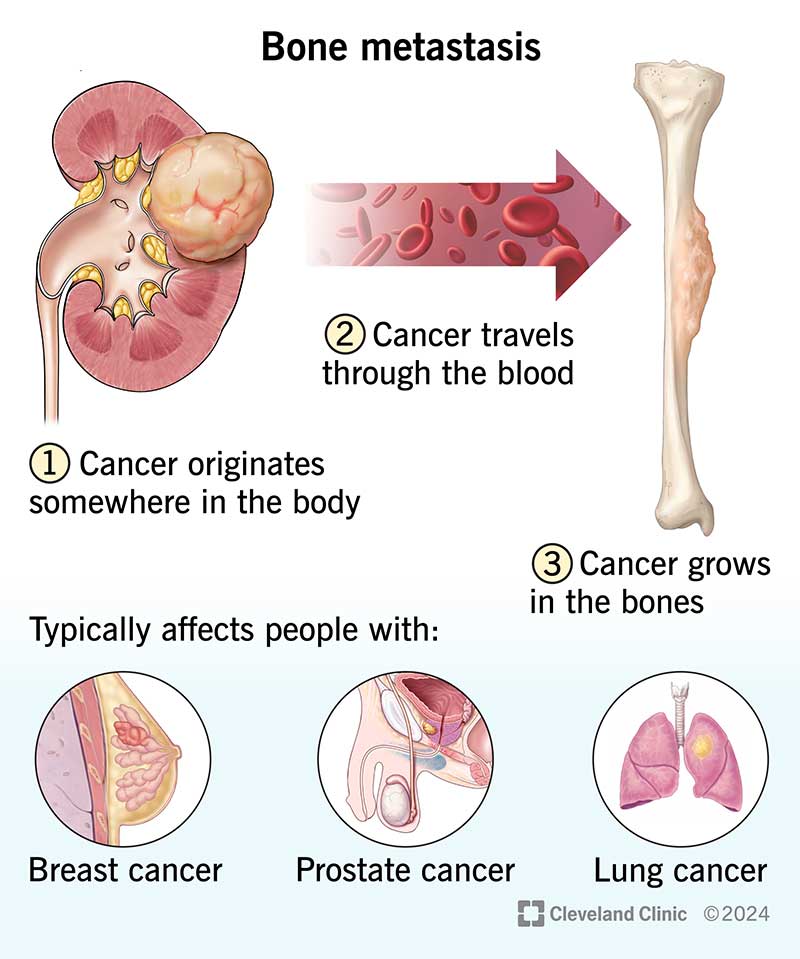Bone Metastases

Bone Metastases
Bone metastases occur when cancer cells spread from their original site to the bones. This is a common and serious complication of many cancers, especially breast, prostate, lung, kidney, thyroid cancers, lymphoma, and multiple myeloma1236. Bone metastases can develop in any bone but are most frequently found in the spine, pelvis, and long bones such as the femur1.
Pathophysiology
Cancer cells travel through the bloodstream or lymphatic system to the bone, where they settle and may remain dormant for years before becoming active5. Once established, these cells disrupt the normal balance between osteoclasts (cells that break down bone) and osteoblasts (cells that build bone), leading to either excessive bone breakdown (osteolytic lesions, common in breast cancer) or abnormal bone formation (osteoblastic lesions, common in prostate cancer)56. This disruption results in weakened bone structure and various complications.
Symptoms
Bone metastases can sometimes be asymptomatic, but common symptoms include:
- Bone pain: The most frequent and often the first symptom, which may be constant or intermittent and often worsens at night126.
- Fractures: Weakened bones are more prone to breaks, especially in the ribs, vertebrae, and long bones234.
- Spinal cord compression: When metastases affect the spine, they can compress the spinal cord, leading to pain, numbness, weakness, loss of balance, and incontinence123.
- Hypercalcemia: Excessive bone breakdown releases calcium into the blood, causing symptoms like nausea, constipation, confusion, thirst, and frequent urination123.
- Other symptoms: Swelling, reduced mobility, and general weakness.
Diagnosis
Diagnosis typically involves:
- Imaging: X-rays, bone scans, CT, MRI, and PET scans to detect bone lesions6.
- Laboratory tests: Blood and urine tests to check for markers of bone turnover and hypercalcemia6.
- Biopsy: Occasionally needed to confirm the diagnosis and rule out primary bone cancer3.
Complications
- Pathologic fractures
- Spinal cord or nerve root compression
- Hypercalcemic crisis
- Impaired mobility and disability
- Bone marrow suppression
Management
Treatment is multidisciplinary and aims to relieve symptoms, prevent complications, and improve quality of life, as bone metastases are generally incurable1345:
- Medications: Bisphosphonates and denosumab to strengthen bone and reduce complications; pain medications; corticosteroids for swelling; and drugs to manage hypercalcemia.
- Radiation therapy: To relieve pain and control local tumor growth.
- Surgery: For stabilization of bones at risk of fracture or to relieve spinal cord compression3.
- Minimally invasive procedures: Vertebroplasty, embolization, thermal ablation, and other techniques for palliation in selected patients3.
- Systemic cancer therapies: Chemotherapy, hormonal therapy, targeted therapy, or immunotherapy depending on the primary cancer type35.
Prognosis
Prognosis depends on the type of primary cancer, the extent of bone involvement, and the patient’s overall health. Some cancers (e.g., breast, prostate, thyroid) have a relatively better prognosis with bone metastases, while others (e.g., lung, liver, pancreas) are associated with poorer outcomes3.
Summary Table
| Aspect | Details |
|---|---|
| Most Common Cancers | Breast, prostate, lung, kidney, thyroid, lymphoma, multiple myeloma |
| Common Sites | Spine, pelvis, femur, ribs, skull |
| Main Symptoms | Bone pain, fractures, spinal cord compression, hypercalcemia, weakness, incontinence |
| Diagnosis | Imaging (X-ray, CT, MRI, PET), blood/urine tests, biopsy |
| Treatment | Medications (bisphosphonates, denosumab), radiation, surgery, systemic therapies, palliation |
| Prognosis | Variable, depends on primary cancer and extent of disease |
Consult with Our Team of Experts Now!
At DrStemCellsThailand (DRSCT)‘s Anti-Aging and Regenerative Medicine Center of Thailand, we emphasize comprehensive evaluations and personalized treatment plans of Cellular Therapy and Stem Cells for managing various health conditions. If you have questions Bone Metastases or would like more information on our services, consult with our experts today!
Consult with Our Team of Experts Now!
References:
- [Mayo Clinic: Bone Metastasis – Symptoms & Causes]1
- [Canadian Cancer Society: Bone Metastases]2
- [PMC: Current Overview of Treatment for Metastatic Bone Disease]3
- [PMC: Bone Metastases: An Overview]4
- [Physiological Reviews: Bone metastasis: mechanisms, therapies, and biomarkers]5
- [Cleveland Clinic: Bone Metastasis]6
Bone metastases are a frequent and serious complication of advanced cancer, leading to pain, fractures, and other complications. While they are rarely curable, modern therapies can significantly improve symptoms and quality of life.















